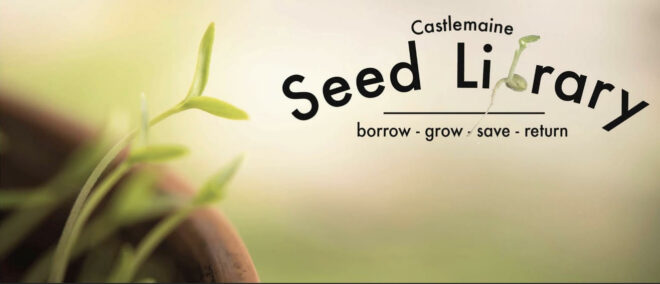Seedy Sunday inspires a ‘joyous inaugural seed swap’ in Castlemaine
Seeds belong in community, being grown and harvested each season — whether in a community garden, school patch, backyard or balcony. A majority of the world’s seed supply is now controlled by just a handful of corporations. It’ll take a dedicated village to keep seeds in the hands of communities.

This summer we had a visit from Eliza-Jane Gilchrist from Castlemaine Seed Library. Despite being 10,000 miles apart, we share a mission of encouraging local people to grow food from good quality biodynamic seeds. These locally grown and saved seeds become adapted to local growing conditions, crucial when they are facing changing weather conditions. Since their launch in 2016 they have provided access to people through a library system that encourages people to: Borrow, Grow, Save and Return.
Interesting to find out about their indigenous plant and seed saving project, run with a local ecologist bringing information about the ecological significance of each plant and a local plant propagating expert sharing valuable knowledge about propagation and a member of the Dja Dja Warrung clan to guide and educate around cultural knowledge of the plants. With this combination of wisdom and knowledge they are hoping all growers will develop a connection to the local plants they have growing around them. We don’t see Kangaroo Grass, Hoary Sunrays or Murnong on our seed list!

We gave Eliza-Jane the lowdown on the why’s and how’s of Seedy Sunday.
Little did we know that we would inspire her very first seed swap as soon as she got back to Australia.
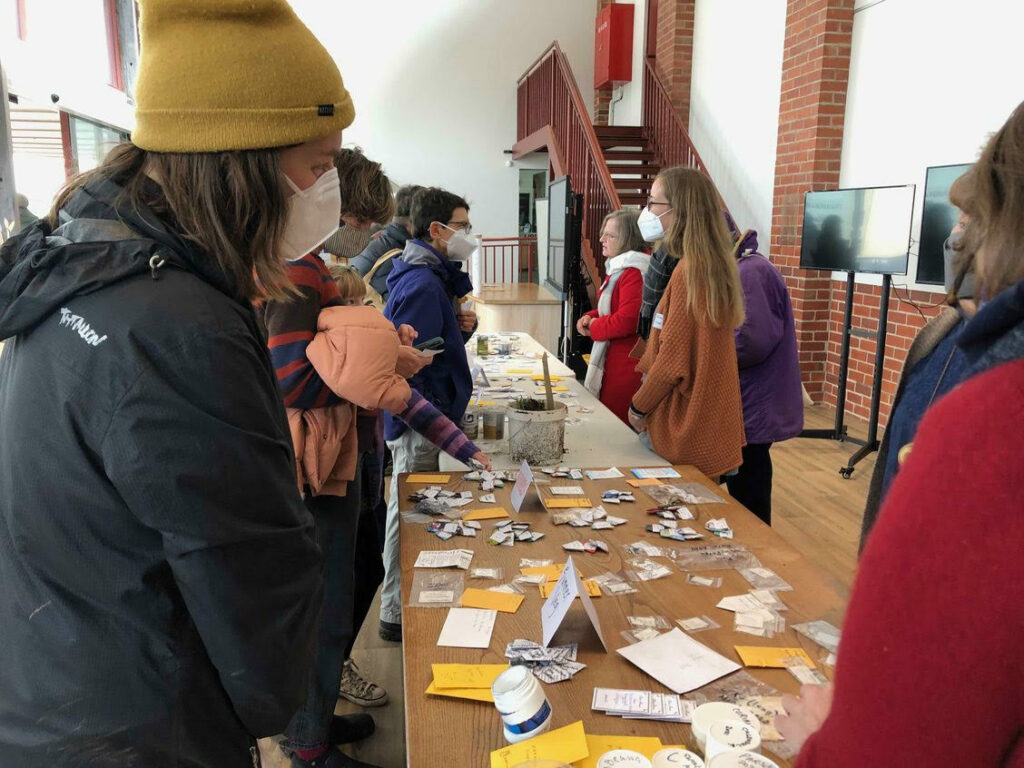
We were delighted to appear in their newsletter and reproduce it here, with thanks to Eliza-Jane and her team at Castlemaine Goldfields Library.
Copyright (C) 2022 Castlemaine Seed Library. All rights reserved.
Seedy Sunday Brighton and Hove
I was in the UK last month visiting family, and took the opportunity to find out more about the UK’s longest running Seed Swap. I met most of the committee, Kate, Fenella, Ros, Saskia and Beth, who kindly came (with a picnic!) to the picturesque One Garden, in Stanmer Park, just outside Brighton. We talked about the how and why of swapping seeds, and the various organisations doing great work in food security, sustainability and ‘no-waste’ in Sussex.

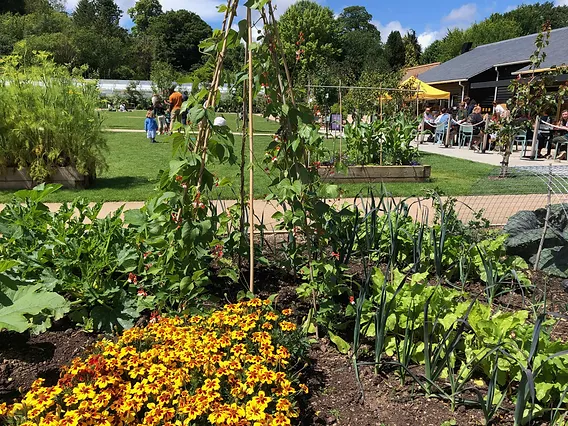
EG: So how do you structure your seed swap?
Kate: The event is once a year. First Sunday in February. And we choose that time because that’s when most people are working out what seeds they’re going to get to plant in the Spring. So it’s an opportunity for people to boost their stash of seeds and also sort out the seeds they might save themselves they year before. So we hire a municipal building. It’s been changing lately because of covid, but for a long time we were in a 6th form college and we took over their sports hall and some of their classrooms. We would have more than just the swap. So the swap was the heart of it, but we also allowed local community groups and commercial organisations to have stalls, a bit like a mini fayre. So we’d have the seed swap in a big classroom. At the market place we’d have a pop-up cafe, which is a local non-profit organisation that uses food that would otherwise go to waste. We have a children’s area with activities for children and we have speakers. So we have a 6hr schedule of speakers. This is when we’re up and running all guns blazing. I’m not talking about recent times with covid. This was the model right at the beginning.
Saskia: And how many people came? 2000?
Kate: Over the day up to 3000? That’s how come we say that we’re the biggest and the oldest in Britain.
Saskia: We charged a small fee for entrance.
Kate: Yes, we charged three pound to come in.
Ros: We started very small.
Beth: You were there at the beginning, weren’t you Ros?
Ros: No, not at the very beginning. I started when we were at the Old Market.
Kate: That had stalls as well. That had a marketplace. So we’ve always had that model of marketplace, swap, speakers. The speakers are a big draw actually! And the children’s activities. There’s a real buzz to the whole event.
Beth: And we’ve had Gardeners Question Time gardeners. That’s an amazing draw!
Kate: A couple of times! And they’ve not just run the question and answer but they’ve walked around the event and talked to people. Interviewed Ros, who’s our seed expert!
EG: So there’s no continuity of packaging. They just hand them in?
Fenella: We advise on how to label them.
Beth: There are demonstrations on the day as well. Ros does some seed-saving demonstrations.
Saskia: We have special little envelopes that say ‘Seedy Sunday’ in a very popular organic food shop in Brighton.
Beth: Infinity Foods sponsor the event.
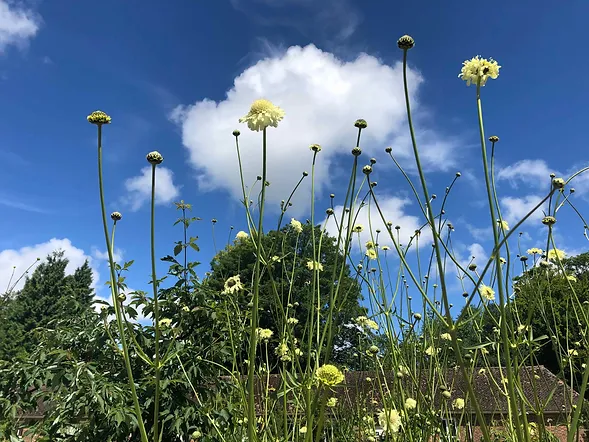
Kate: The envelopes guide them what to write. So it’s got the type of seed. The variety. Where collected. When collected. So that’s asking people to try and be specific. Obviously they don’t always know the variety. We’re quite careful with the where collected as well. We do a clear out so that we don’t have anything more than 2 years old.
Ros: Yes, certain seeds we don’t keep, like parsnips. Some beans, some peas. But they usually go anyway. This year I don’t think we had any seeds left. Oh no, I had plenty of aubergines!
Beth: Ros has a really good system of displaying them. So they’re within areas, aren’t there? There’s a beans area and a legumes. Brassicas.
Ros: Yes, they’re in families. And arranged, for people who garden and do a certain amount of rotation, or garden biodynamically, they can find them very easily.
Kate: And we do have flower seeds as well.
Ros: We put the flowers alphabetically, or, flowers for pollinators, flowers for dying, or whatever.
EG: So then people can just walk around and help themselves?
Kate: Well there’s volunteers. We have it arranged so that it’s like a big rectangular set of tables that are set up. And then there’s volunteers on the inside, and people come round the outside. It’s a bit like a jumble sale I suppose. You’re meant to come in with your seeds to hand in. You have to hand those in to a volunteer really, we don’t want you to put it willy-nilly. So the ideal is that, say you’ve come with 10 packets of seed, you hold your 10 packets, or have them in your bag. Then you collect the 10 packets that you want and you walk up to a volunteer and say ‘here are my 10 packets, here’s the 10 packets that I’m taking’. We were in a different venue this year because of covid. It was an open market which is designated as a non-indoor space. It was much colder so we didn’t have speakers.
Beth: And there wasn’t the entrance fee, so anyone could come.
Kate: It was interesting because I think we got a new bunch of people that weren’t even particularly interested in gardening.
Saskia: It was a public thoroughfare, so people just showed up and walked through there.
EG: Yes, it’s important where you locate yourselves.
Kate: I quite liked that about it.
EG: We think about that as well, how do we get the seeds to the people who really need to be growing food?
Ros: We can do that via community groups. In Brighton that would be our way.
Kate: Fenella’s been amazing at building up relationships with the community groups. It really took off during covid. Cos we couldn’t run an event at all in 2021. So like your library, we used Infinity Foods, our sponsor, the local organic shop, as the place that people could go and get seeds and drop seeds off. But also we packaged up a lot and sent them to community groups.
Fenella: Yes, we had already done our buying in November, so we had 5000 seeds all packaged up, ready to go. And then as we slid into the first lockdown.
Ros: But it worked, didn’t it?
Fenella: So we thought how do we get seeds to the people we know rely on Seedy Sunday to get their seeds inexpensively, and be able to get organic seeds? Locally grown seeds. But then also because of the forces of lockdown there was no compost to be had. There were no seeds. We found ourselves suddenly in great demand.
Ros: Everybody wanted our seeds!
Fenella: But we didn’t take advantage of that! So we publicised out to our newsletter, which is about 2.5 thousand people on our newsletter. So we made all these special seed packages, 10 varieties in a pack, very nicely curated by Ros. And then we did a version which was 3 of those for community groups, which was 30 packets. Any individual could apply for a seed pack, a variety pack of 10 and make a donation, so a fiver. Some people didn’t. They gave us two quid. So our treasurer James set up this online trading system. We did OK. We broke even.
Kate: Infinity Foods’ve been going for 50 years, so they’re even older than us. It’s an organic Co-op based in Brighton. As well as their retail shop they used to have a nationwide wholesale organisation. They supply to health food shops all around the country. So Infinity were very kind. They said, OK, we’re allowed to open as a shop, we’re allowed to trade. I mean a lot of businesses just had to stop. So Infinity said OK we’ll be the distribution centre. We had a month before end of March to pack them. So then people were getting their seeds. That was great. Then we realised that all of the community groups had gone into overdrive trying to feed people. Food banks. Small community allotments. Some of the school allotments. This was when the schools were closed. So community groups were needing seeds. We have an amazing local organisation, Brighton and Hove Food Partnership. They are a partnership of all sorts of organisations, community organisations, across the whole of Brighton and Hove. So I contacted their network. I managed to get 45 names and addresses. We spent the beginning of lockdown distributing seeds to individuals on our mailing list, and also these 45 community groups that we made contact with for the first time. Ros was doing an amazing job because we couldn’t get hold of any more seed. So we were repackaging. We had collection boxes at allotments. Beth designed these beautiful boxes. So that was the covid year. We managed to keep going. And then the following year, which was this year, February ‘22, we held it at the open market. It’s not completely open, but it’s about the size of a football pitch I think. It has got a roof over it, but it’s a metal structure and concrete floor, so it’s a wind tunnel. That was really cold!
Fenella: At least we held it.
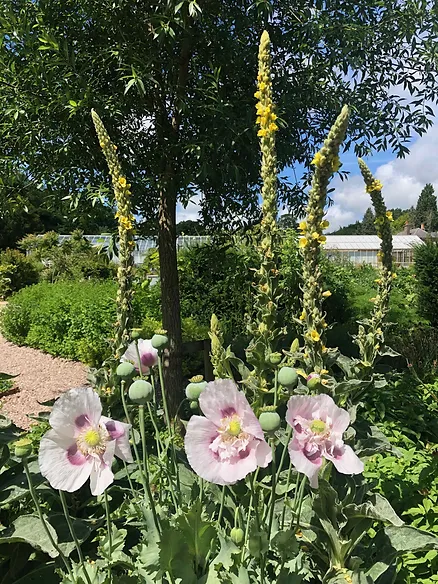
EG: So what do you do when people are giving you their donations, and you have something like..
Kate: Dandelion seeds!
EG: That hasn’t happened yet has it?
Kate: No but we always talk about it as a possible scenario! We allow them to go into the swap. We have a wild card table.
Ros: Because people will be looking for some oddities.
EG: I agree, I’m always looking for unusual plants.
Ros: I look for the oddities as well. And sometimes people will bring seeds from African crops.
Saskia: Millet.
Ros: We put them back in there. But you have to think about imports. If you bring a plant in a country…think of the rhodedendrons, which were brought by the Victorians to decorate their gardens, and now they’re a weed. So if somebody brought us for example a huge bag of something which looks a little bit suspicious and you think, well if everybody grows this we’re going to be overrun. I remember one year, I didn’t put it back in the pile, but there was somebody brought some jimson weed seeds. (Datura stramonium) And I looked it up and I thought, oh my god, we don’t want this here.
Kate: But we will take anything that’s offered to us really.
EG: What were your initial aims in beginning it?
Kate: You’re asking our predecessors, cos it’s been going 20 years.
Saskia: It was Monsanto really. When it became rife that we weren’t allowed to buy local seed, that it all had to be controlled, and we went ‘like hell’!
Kate: There used to be a handstamp that you got when you paid your three pounds and went in, you had a handstamp, and it said something like ‘I’m a Seedy Outlaw’ or something like that!
Ros: ‘Seed Rebel’
Saskia: Because it really is shocking. Subsistance farmers who need to save their seed to grow the next lot get given seed from Monsanto that you can’t save. And then it’s illegal to get them from somewhere else.

Kate: We had some lovely online things that came out because of lockdown, acutally, and that was a nice thing, that was spreading the message more widely. So when we were in lockdown we contacted other seed swaps in Britain and shared notes about what are they doing to cope with the situation, but also a bit more in solidarity, and then we ended up running a joint webinar together where we had a speaker from Palestine speaking about reviving ancient seeds from Palestine.
Saskia: Wheat. Special golden wheat.
Kate: ‘Tall dark and handsome’ is the name of the wheat. Vivien Sansour is the name of the woman who spoke and that was lovely to have that international side to seed guardianship. There’s a not-for-profit in the UK called The Gaia Foundation and they have a seed sovereignty network in the UK who have co-ordinators for the different parts of the UK, so we’ve become closer to our South East England co-ordinator. And we’ve participated more in those seed sovereignty events. Didn’t you speak at one, Ros?
Ros: Yes, I did.
Saskia: And we met Seed Swap Bristol, Seed Swap Lewes and Cambridge
EG: And how do you decide what seeds you’re going to buy?
Saskia: You get the catalogue and peruse it!
Kate: We look at what swapped out quickly.
Ros: Well first of all we work out, no F1s, so that takes care of some in the catalogue. Also from experience of growing. I mean I have been growing different heritage varieties for more than 30 years, so you do know what’s doing well and what isn’t. Also I think, each year when we’ve been looking at the catalogues we’ve been like kids in the sweet shop. Oooh, we’ll try some of that! Oh, I haven’t grown that before.
Kate: We try and go for unusual stuff as well.
Ros: Yes, that’s right, and people sometimes at Seedy Sunday will say oh do you have any of those? And you think, ah, maybe next year I will try that. Also you have to think about people who might not be gardeners. They might want to grow a window box, or they’ve got a tiny little patio. So you’ve got to think about things which are easy to grow and will get them hooked on growing stuff.
Kate: People really love the event. Gardeners really love it. You know, gardeners spend a lot of time on their own. But generally love talking about gardening. So they’ll end up talking around the seed table about their own particular passion. We call it the start of the gardening year, because it’s when people are starting to think about chitting their potatoes or early seeds, or what seeds they’re going to buy, so it’s got a real place in the hearts of people. We always come on local radio on the day because they have a gardening programme on a Sunday morning and they always talk about Seedy Sunday.
Ros: Some people come back every year. I’m thinking about the old boy who grows tomatoes from all over the place. He’s very ancient now, but he was there last year.
Beth: We do get people from London and all over don’t we?
Kate: We had a coach load of people from London one year. Pre-covid
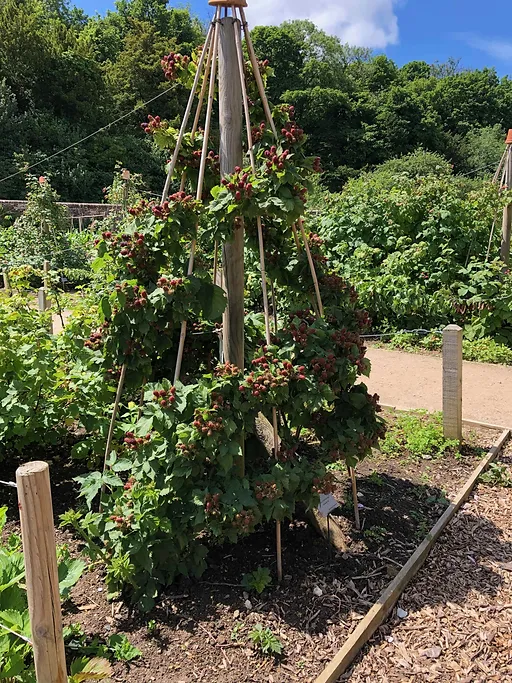
EG: The Seed Swap has got everything going for it. There’s a real generosity in it. And you were saying it’s the start of the gardening year, and the whole reason why gardening is so wonderful, is that there’s always something to look forward to, there’s always a new season. And then, with the old chap that you were talking about, there’s that lovely social history aspect of it. That someone’s nurtured something over many years and has something very particular and unique that they then want to share, because, of course, the plants need to be in the ground. You can’t hang on to them. They have to keep growing. You can’t hoard them.
Saskia: And you know you said generosity just now, we did ‘Grow an extra Row’ to help foodbanks. We gave seeds for free for that very purpose, so people could grow more and then bring it to the foodbanks. And there’s a place in Brighton called the Real Junk Food Project. And I was there when people brought bags and bags of kale and suchlike, and I thought, it’s worked!
EG: So why is it called the Real Junk Food?
Kate: Because usually they get their food from… they divert it from going to landfill.
EG: That’s a great name!
Fenella: Particularly through lockdown a lot of people were struggling to eat.
Kate: We have, in Brighton, lots of community groups like FairShare and the Gleaning Network, which are all run independently. There’s a lot to volunteer for.
Copyright (C) 2022 Castlemaine Seed Library. All rights reserved.
https://www.castlemaineseedlibrary.org.au/ Follow them on facebook/castlemaineseedlibrary

